Debunking profit myths on real estate and securities investments
When it comes to investments, stock market experts are quick to sell securities as the best option for higher profits. Nevertheless, the magical formula packaged as the great “higher
Real estate is less liquid
Low liquidity is one of the major drawbacks of real estate. It can take months to buy or sell a property while securities can be disposed of almost immediately.
“Say you need to sell your assets off for cash. Those who’ve faced the challenge are aware that selling a real estate item involves a lot of time and effort. Sometimes it takes a few months or even years until a truly willing buyer shows up,” explains Alexander Prosviryakov, investment expert in treasury and commodities.
Real estate investors are less concerned with low liquidity than their stock market counterparts: when property has been owned for several years, it’s not a big deal if the transaction takes a few months to complete.
Trading stock is cheaper
Real estate transactions cost more than securities trading.
“On average, it takes
As a general rule, property transaction charges are perceived as more significant by those looking to buy and sell quickly than owners of several years.
No golden rule for high profits
Increased value of investments over time is a prime argument for experts of both camps. However, because growth indices of securities and real estate items differ over time and depending on location, there is no definite answer to this question. Stock market experts promise increased gains for securities over the short term while the chart below, comparing the average annual rise in real estate prices and major stock indices of national exchanges around the globe over the past 20 years, shows that there is no golden rule for making good investments.
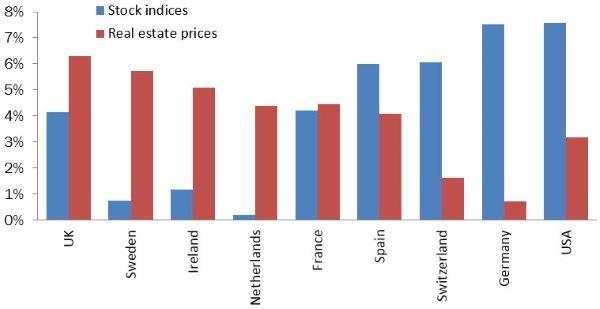
In some countries, real estate grows faster than
However this index only presents an average for a group of stocks and does not preclude quicker growth for certain securities. The same goes for property and popular locations which boast significantly stronger growth than national averages. A prime example is London where, for the past two decades, real estate prices have grown at an average annual rate of 9% against 6% nationwide. In realistic terms, because real estate cycles are longer than the stock market’s, it’s easier to spot a promising property market than a potentially volatile share.
Indeed, securities can be more profitable and considerably outperform real estate over the short term. Some share prices can rise severalfold in days and even trusted shares like the Down Jones Industrial Average (DJIA) stocks can grow rapidly. For instance, half the DJIA companies saw their shares gain 10% and some even 40% in 2014. In contrast, real estate prices do not experience
Profitable low risk investments
Real estate prices are less volatile because the cyclical periods of growth and decline last longer. As opposed to securities, real estate prices don’t drop too low during downturns and hard times. For instance, European property prices lost 4% on average and no more than 10% across most of the region in 2009 according to OECD data. During the same period, all the major share indices lost
Securities are riskier investments because they are more sensitive to market changes while price depreciations are stronger and more common. Furthermore, portfolio diversification is not a guarantee against losses during a recession.
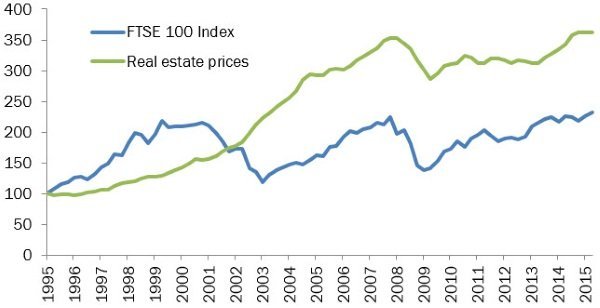
The above chart compares average stock fluctuations on London’s FTSE 100, composed of companies from various industries, with real estate prices in the UK over the last 20 years. Stock value on this index has demonstrated less growth overall as well as infrequent but clearly defined downward trends, while real estate prices have shown far steadier growth.
Property is a good investment in terms of savings as it grows faster than inflation, thus protecting money from currency devaluation. In fact, property has outpaced inflation by 1% annually on average since 1990.
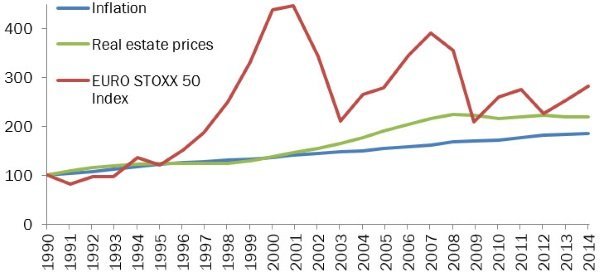
The EURO STOXX 50 is composed of the 50 largest and most liquid stocks in the Eurozone and is also highly volatile, so while there are large profits to be made, the investor must have utmost confidence in his market knowledge or the trader managing his portfolio.
Additional sources of revenue
Alongside steady price increases, real estate owners can also benefit from rental income generated by their property. For example, well-researched investments into retirement homes can yield
In the case of securities, additional regular revenue should be generated by dividends and coupon payments on bonds for instance. However, stocks presenting risk parameters similar to real estate
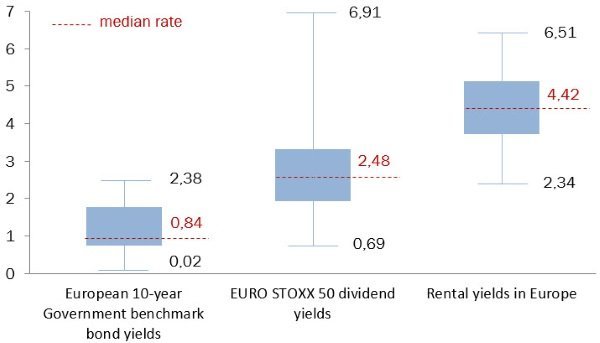
Coupon payments on corporate bonds are not too generous either. According to Business Insider, over 90% of European companies offer corporate bond payments of maximum 2.5% per annum while average rental yields
Real Estate Investment Trusts (REITs) earned the highest returns compared to all stock market assets, including securities, commodities and cash deposits over
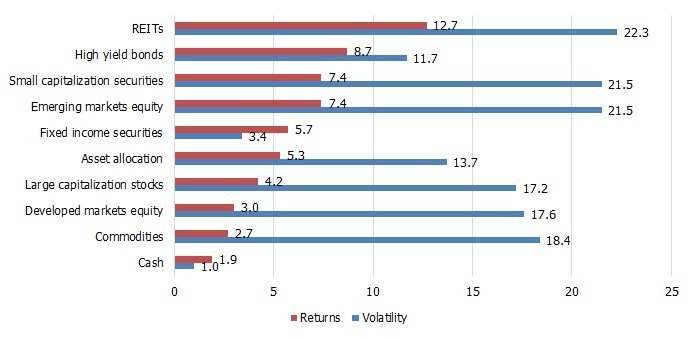
Play it big or play it safe
Real estate and securities investments have distinct attributes in terms of profit, liquidity and risk. Diversifying your portfolio into both vehicles has the potential to balance risky
Yulia Kozhevnikova, Tranio
We will send you a content digest not more than once a week